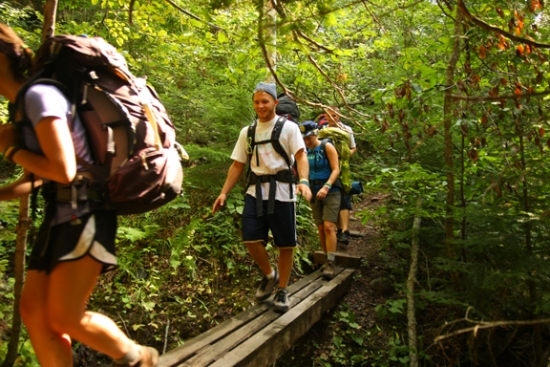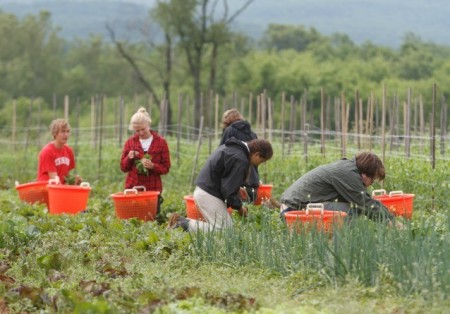EcoLeague Schools Recommended as Great for Nature Lovers

Five EcoLeague colleges made the list of recommended schools for students looking for “the perfect balance between academics and outdoor activities you can enjoy” according to the article 30 Great Small Colleges for Nature Lovers, featured on Great Value Colleges. Universities and colleges were ranked via a points system that takes into account the number of nature-focused courses/degree programs, proximity to outdoor opportunities, a university’s green status, the campus and surrounding area, and the number of outdoor-oriented sports, clubs and teams.
Here’s what the article has to say about each EcoLeague School:
#15: Within the 155 acres of Green Mountain College’s campus, students will find an organic farm, a ropes course and many hiking and biking trails. This college’s curriculum centers around nature with undergraduate majors like adventure education, animal conservation & care, environmental studies, natural resources management, renewable energy & ecological design, sustainable agriculture & food production and wilderness & outdoor therapy.
If choosing one of those majors is not enough to satisfy your love for nature, you can join any of the many outdoor trips and clubs, such as the outdoor recreation alliance, skate club, Farm Crew, equestrian, the ski shop and more.
Green Mountain became the second college in the nation to become carbon neutral in 2011 after installing a biomass plant, a wind turbine and solar panels.
#21: While Anchorage offers students a vast base of exploration in the wilderness of Alaska, Alaska Pacific University promotes responsible stewardship of the environment through its “Active Learning” program. Students can study the terrain and wildlife of the state through this program with hands-on interactions with their natural surroundings. And Alaska Pacific offers a variety of nature-related majors and minors, like marine biology, outdoor studies, sustainability studies, Earth sciences and environmental science. In fact, five out of the seven undergraduate degree programs deal with nature.
On the school’s 175-acre campus, students can connect to the Anchorage Trail System, which provides 5 km of continuous trails and includes Hillside/Service, Bicentennial Park, Chester Creek Greenbelt, the Coastal Trail and Kincaid Park.
#22: Northland College has a distinctive environmental liberal arts curriculum with a beautiful natural location for nature-loving students to achieve their goals. According to Her Campus, a typical student at this school is described as a “friendly ‘environmentalist tree-hugger’” with a penchant for activism and outdoor activities. A student’s experience at Northland actually begins with a required Outdoor Orientation trip, which consists of five- to 12-day adventures with kayaking, sailing, camping, astronomy-themed backpacking and more.
Northland works with the Sigurd Olson Environmental Institute to promote stewardship, identify opportunities, deliver educational programs and facilitate solutions that address environmental issues. The sustainability advances of this school are beyond most on this list.
#23: The College of the Atlantic is said to live and breathe sustainability. The few hundred students at this school are all enrolled in human ecology, which is the study of our species’ relationship to the planet. It was the first school to go completely carbon-neutral in 2007. The school’s teaching methods largely consist of field-based learning and community involvement, making it impossible to stay indoors. The campus surrounds two organic farms and two off-shore island research stations. The campus is situated in the Mt. Desert Island, which is covered by the Acadia National Park.
Incoming students have the opportunity to go on the school’s many outdoor orientation programs, which explore Maine’s wilderness with rock climbing, sailing, kayaking, diving and more. Although the school only offers the one major in human ecology, students have the ability to design that major by choosing different classes in subjects like animal behavior or jazz, rock and blues.
#25: Prescott College is based in a mountain town where rock climbers flock for trad and sport climbing on Granite Mountain; the town of Prescott has an elevation of 5,347 feet. According to Outside Magazine, 60 percent of Prescott students—who self-design their curriculum—choose environmental studies or adventure education. The school also operates a marine research station in Bahia Kino, Mexico.
For those of you nature lovers who like the sound of majoring in adventure education, Prescott’s website explains, “An Adventure Education graduate may be found guiding clients safely up a vertical rock face, forecasting avalanche dangers at a Forest Service avalanche center, piloting a raft on a whitewater river to monitor ecosystem health, or managing logistics and field risks while scientists work on a remote ice cap.”
Students who attend an EcoLeague member college have the opportunity to attend up to two other schools in the consortium for the same tuition as their home school; their financial aid package and other scholarships also apply toward their semester away from home. This means a nature-loving student from Prescott College can round out their degree with a semester spent studying sustainability at Northland College, whale watching during biology class at Alaska Pacific University, or any other number of unique experiences offered by the EcoLeague Consortium.
EcoLeague Schools Gain Praise for Green, Environmental Programs

Four EcoLeague Colleges made media lists as green colleges with strong environmental programs recently. Northland College was listed as number one in Mother Nature Network‘s special feature “10 of the Best College Environmental Programs in the U.S”. Green Mountain College and College of the Atlantic were also highlighted; EcoLeague Consortium Schools comprised over a third of the colleges represented in the article. In MNN’s “17 Amazing Green College Campuses” both Dickinson and Green Mountain College were praised for their farm-to-cafeteria programs.
Some highlights from the features:
Northland College: “At Northland College, environmental studies isn’t just a major — it’s a part of the school’s education requirements across all curricula. The Environmental Sciences Department offers majors in environmental chemistry and environmental geosciences; the Natural Resources department includes emphases on ecological restoration, fisheries ecology, and wildlife ecology; and the Nature and Culture Department allows majors in outdoor education, humanity and nature studies. The Sigurd Olson Environmental Institute brings environmental responsibility to the surrounding community, and since 1971 the school has stressed sustainability across the board: Classes like sustainable business, sustainable agriculture, and renewable energy prepare students for a green future, while an off-grid building insulated with straw bales and an eco-friendly residence hall that was a prototype for the LEED rating system help them understand sustainability now.”
College of the Atlantic: “While the other colleges on this list offer a wide variety of environmentally-related degrees, College of the Atlantic takes the opposite approach: Students share one major — human ecology — and then tailor the course load to his or her own specific interests. Social and environmental issues take center stage though, as all the students are expected to address them through their self-designed curriculum and senior project; examples of past projects include a photographic exhibit based on the birds of Hawaii; one student’s wilderness immersion trip along a Virginia creek; and a multimedia fundraiser for a Zimbabwean nonprofit.”
Green Mountain College: “This Vermont school is the first U.S. college to achieve climate neutrality through campus-wide efficiency, adoption of clean energy, and purchase of local carbon offsets. Every course of study has environmental, social and economic sustainability as an overall theme and nearly half of all graduates end up with green careers. The campus generates 80 percent of its heat from a $5.8 million biomass plant that burns locally harvested wood chips, and the school plans to meet all of its energy needs with 100 percent renewable energy by 2020. Green Mountain is also a leader in sustainable farming education. The campus 21-acre Cerridwen Farm supplies produce for the dining hall where food scraps are later collected and used as compost for the farm.”
Dickinson College: “Student farmers grow organic vegetables and raise free-range livestock on this Carlisle, Pennsylvania, school’s 50-acre USDA certified-organic college farm. Food from the farm is served in the dining hall, sold at a local farmers market, and donated to a community food bank. Each day 800 pounds of food waste is sent back to the farm to be converted into compost, cutting in half the volume of waste sent from the dining hall to landfills. The college offers more than 100 sustainability courses, integrated throughout the curriculum and across many majors. In 2013-14, nearly 60 percent of students took at least one sustainability-related course. The school has created a Climate Action Plan to achieve climate neutrality by 2020.”
EcoLeague to Present at Green Schools National Conference
From March 4 – 7, advocates for green, healthy and sustainable K-12 schools from around the United States will be gathering in Virginia Beach at the Green Schools National Conference. The EcoLeague will not only have a booth in the exhibition hall, but will be presenting a program for middle and high school students at the Student Summit happening concurrently with the conference. Just as the EcoLeague believes in connecting resources and awareness across member schools, it supports teachers and students striving for sustainability at all educational levels.
“Connecting the Dots: From Green Schools to Green Colleges to Green Careers” is an interactive session that will help students understand the connections possible when attending an environmentally-focused college and the unique opportunities they present for entering green careers. Two students from Eco League schools, Kaylee T from Northland and Lexie R from Dickinson, will share their experiences about attending colleges, and the growth they have experienced through studying at Eco League colleges. EcoLeague representatives Alan Brew from Northland College and Andrew Hunsinger from Green Mountain College will also participate in the interactive session, which will highlight the Green 360 Career Catalyst, an online resource that helps students discover how their individual passions and skills fit with green careers. Working backwards from these results, Alan and Andrew will outline pathways students can take through their current secondary school classes and future university career that will best prepare them for our green future.